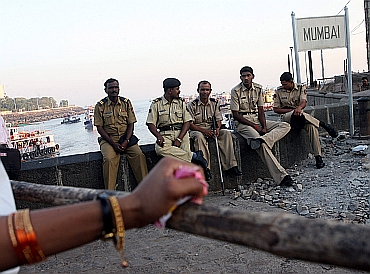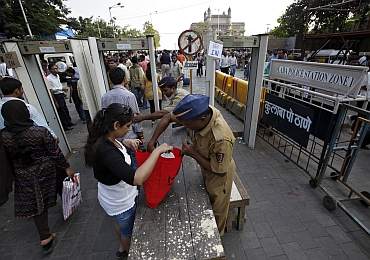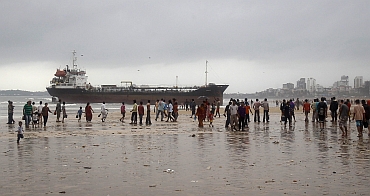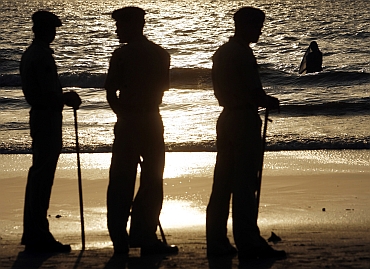Photographs: Reuters
India's coastal security remains as vulnerable as ever due to poor human reflexes despite the lessons learnt from the immense tragedy of 26/11, when 10 members of Pakistan's Lashkar-e-Tayiba managed to infiltrate by sea into Mumbai and carry wreak havoc for three days.
Advance intelligence about LeT's plans of a sea-borne commando raid was available, but, despite this, the strengthening of the coastal defence and inland security in the targeted coastal areas was unsatisfactory. This offered spectacular success on a platter to the LET.
The failure of the human element and not deficiencies in technical capabilities was largely responsible for LeT's success. There was no advance thinking on what kind of follow-up action was called for on the available intelligence and on how to take that follow-up action and under whose operational leadership.
...
Failure in identifying deficiencies in coastal security
Image: A policeman checks a visitor's bag at a security checkpoint at the entrance of the Gateway of IndiaPhotographs: Reuters
Corrective action to improve coastal security and alertness was reportedly taken following the nasty surprise of 26/11. This action consisted of more and better boats and other equipment, better training to improve capabilities and better co-ordination architecture.
This corrective action should have normally enabled those in charge of our coastal security particularly in a sensitive area such as the Mumbai coast to enhance the cover in order to prevent any more nasty surprises. But this is not the case. The corrective action has fallen short of achieving its aim of identifying and correcting gaps and deficiencies in coastal security.Pavit exposes chinks in coastal security
Image: MT Pavit drifted across the Arabian sea from Ras Al Madrakah in Oman following engine failure and flooding of its engine roomPhotographs: Reuters
" The Navy, responsible for security beyond 12 nautical miles, the Coast Guard, which patrols the zone between 5 and 12 nautical miles and the newly-created Marine Police, all failed to detect it," the report said.
If the report is correct, a disabled ship, abandoned by its crew, had been drifting for nearly four days near or in our coastal waters before running aground on our shore and none of our agencies responsible for coastal security noticed it, raised an alarm and set in motion a drill for neutralising any possible threat.
Security personnel poor in alertness, reflexes
Photographs: Reuters
If the human alertness and reflexes do not improve even the best of equipment cannot strengthen our security. This embarrassing incident calls for a detailed enquiry and should not be allowed to be covered up.





article